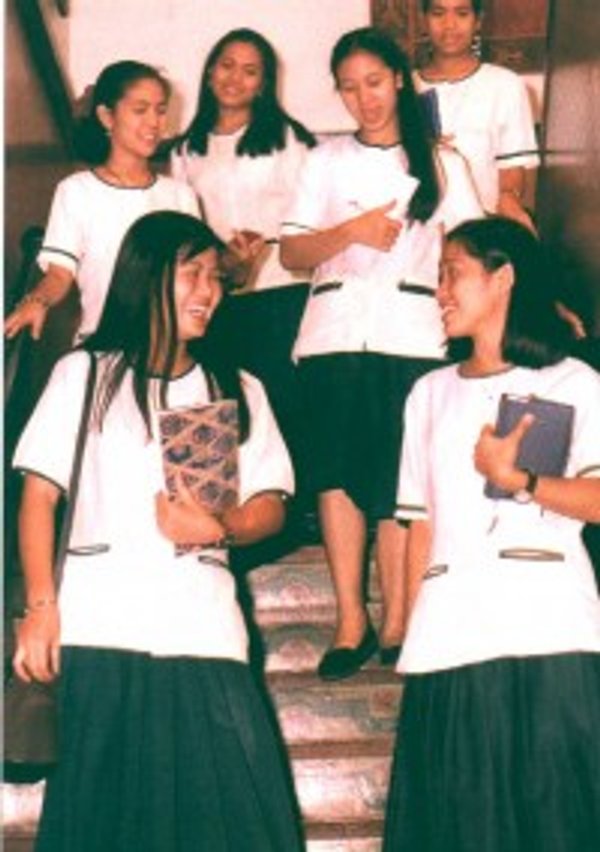WHEN MAE AGNES RUSIA finished high school in 1993, she braced herself for a year ahead as an out-of-school youth.
A year before, an older sister was accepted as a freshman at the University of the Philippines in Diliman, Quezon City. Rusia knew that the meager family resources eked out by her on-and-off employed radio technician father and dressmaker-mother would have to go to her sister’s daily needs.
During a career-orientation program for graduating students at the Quezon City High School, Rusia got hold of a leaflet from Punlaan School.
“I was attracted to the P500 monthly allowance; I need not ask for money from my parents,” she said in Filipino.
She applied, and was accepted for the Punlaan School’s Dual Training Scholarship Program in Food and Beverages Services.
At that time, Rusia said she did not know anything about the Prelature of Opus Dei, the controversial Catholic institution and moving spirit behind Punlaan School.
Student becomes teacher
Today, 30-year-old Rusia teaches baking to underprivileged girls in Punlaan, gratefully returning the training she received as a scholar at the unique professional training school located in San Juan.
Trained as a baker in Punlaan, Rusia worked at the Manila Peninsula Hotel for five years, and on a cruise liner for a year, earning enough money to help her support two sisters through college and build a house for herself and her parents.
But she did not join Opus Dei, nor does she donate her salary to the organization.“
Joining the Opus Dei is not my vocation, but I am very grateful for everything that I’ve learned in Punlaan,” Rusia, a President Ramon Magsaysay Most Outstanding Worker awardee in 1998, said.
The regular spiritual formation imbued the Punlaan scholars with such values as respect for others, punctuality, honesty, fidelity, trustworthiness, said Rusia, who has a 4-year-old daughter with her husband, Manila Peninsula chief baker Rene Mesina.
100 percent employment

Graduates of Punlaan are sought after by employers in the food industry, which have established partnerships with the institution.
“We have 100 percent employment after graduation,” Luz M. Filmer, executive director, said.
In fact, about 500 graduates of the two-year diploma course on food and beverages service are currently employed in top hotels and restaurants here and abroad.
Punlaan School started in the early ’70s in a garage in New Manila. It was converted into a classroom for household helpers by a group of women who were inspired by the words of St. Josemaria Escriva that love “is deeds, not words.
”Women volunteers gave lessons on cooking, sewing, flower arrangement and even English.
Not owned by Opus Dei
From there, Punlaan moved to West Triangle. In 1975, the Foundation for Professional Training Inc. (FPTI), composed mostly of Opus Dei members, bought a two-story maternity clinic on M. Paterno Street in San Juan, and made it the Punlaan School.
Today, the Punlaan exudes quiet elegance, from its wooden floors, solid doors, hand-painted stairways with elaborate carvings, to the wrought-iron chandeliers and solid-wood pews in the chapel.
Filmer stressed that the school is not owned by the Prelature of Opus Dei, but a “corporate apostolate initiated by members and cooperators with the spiritual formation being entrusted to Opus Dei.”
“We are committed to find better ways of helping underprivileged young women achieve intellectual and cultural excellence and acquire mastery of skills through a program based on Christian ideals. The goal is simple: To help them uplift their status and live a life in keeping with their human dignity,” Filmer said.
Punlaan is just one of about 40 centers and corporate apostolic undertakings by Opus Dei members and associates since the ’60s. These initiatives connect Opus Dei to the less privileged in society.
School for boys

In Barangay Talon, Tuy town, Batangas province, there’s a 10-hectare farm where teenage boys learn modern intercropping techniques and scientific breeding of butterflies. It also offers product marketing, bookkeeping, basic hygiene, table manners, and reflections on the teachings of Opus Dei.
Called the Talon Family Farm School, this unique learning institution is one of seven family farm schools established by the Pampamilyang Paaralang Agrikultura Inc. (PPAI), a non-stock, non-profit foundation composed mostly of Opus Dei members.
But the scholars and beneficiaries of the family farm schools are rural folk, whether landowners or tenants, who may or may not become members of Opus Dei, according to school director Jose San Juan, an Opus Dei supernumerary.
"The goal is to teach students how to make their own farms productive, improve the living standards of their families, contribute to rural development, always guided by Christian values,” San Juan said.
They are exactly like the guiding lights of Punlaan.
